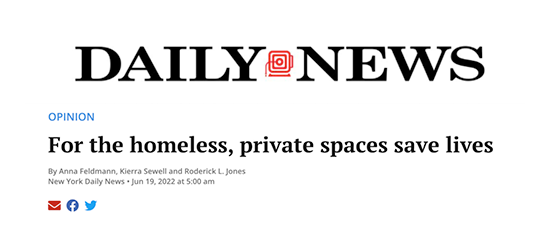
If we want to house people living on the streets, single rooms are a critical piece of the puzzle. That’s the message of an opinion piece in the New York Daily News penned by Anna Feldmann and Kierra Sewell, two members of our Downtown Goddard homeless outreach team, with Executive Director Roderick L. Jones.
The essay opens by recounting how the team desperately tried to get people off the streets after a man shot two homeless people in Manhattan, killing one: “With danger looming for our clients, we threw ourselves into our outreach shifts. We informed everyone with whom we engaged of the attacks and offered them the limited options we had for housing and shelter. We wanted to get as many people as we could off the streets and inside for the night. While some people accepted and were placed in beds, an overwhelming number refused, saying that they would rather take their chances outside than stay in a shared or dorm-style room.”
It may be hard to understand why people would risk being outside with a killer on the loose rather than accept shelter in a shared room. But, the authors continue, people experiencing homelessness often have good reasons to distrust these situations: “Consider for a moment the prospect of falling asleep in a room with one or more people who you do not know. Our clients are likely to have experienced childhood abuse often manifesting as PTSD in adulthood, making it impossible for them to trust that they will be safe and respected in shared settings with strangers.”
The writers argue that single rooms will bring more people off the street, result in fewer transfers within the system—which use up time and money—and result in real improvement for their clients. “Witnessing how much a person changes when they are able to simply sleep and eat consistently for the first time in years is one of the most rewarding aspects of our job,” they write.
The op-ed also urges the city to invest more in outreach teams, which are chronically overworked and understaffed and whose members often face housing instability themselves.